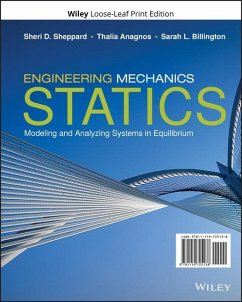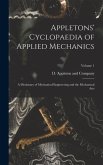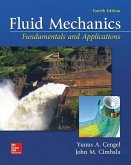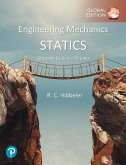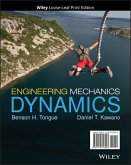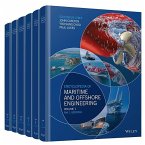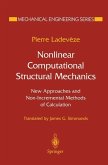Sheri D Sheppard, Thalia Anagnos, Sarah L Billington
Engineering Mechanics: Statics
Modeling and Analyzing Systems in Equilibrium
Sheri D Sheppard, Thalia Anagnos, Sarah L Billington
Engineering Mechanics: Statics
Modeling and Analyzing Systems in Equilibrium
- Loseblattsammlung
Andere Kunden interessierten sich auch für
![Appletons' Cyclopaedia of Applied Mechanics: A Dictionary of Mechanical Engineering and the Mechanical Arts; Volume 1 Appletons' Cyclopaedia of Applied Mechanics: A Dictionary of Mechanical Engineering and the Mechanical Arts; Volume 1]() Appletons' Cyclopaedia of Applied Mechanics: A Dictionary of Mechanical Engineering and the Mechanical Arts; Volume 155,99 €
Appletons' Cyclopaedia of Applied Mechanics: A Dictionary of Mechanical Engineering and the Mechanical Arts; Volume 155,99 €![Fluid Mechanics: Fundamentals and Applications Fluid Mechanics: Fundamentals and Applications]() Yunus A CengelFluid Mechanics: Fundamentals and Applications388,99 €
Yunus A CengelFluid Mechanics: Fundamentals and Applications388,99 €![Engineering Mechanics: Statics, SI Units Engineering Mechanics: Statics, SI Units]() Russell HibbelerEngineering Mechanics: Statics, SI Units68,99 €
Russell HibbelerEngineering Mechanics: Statics, SI Units68,99 €![Engineering Mechanics Engineering Mechanics]() Benson H TongueEngineering Mechanics160,99 €
Benson H TongueEngineering Mechanics160,99 €![Encyclopedia of Maritime and Offshore Engineering Encyclopedia of Maritime and Offshore Engineering]() John CarltonEncyclopedia of Maritime and Offshore Engineering2.162,99 €
John CarltonEncyclopedia of Maritime and Offshore Engineering2.162,99 €![Concurrent Engineering Concurrent Engineering]() Concurrent Engineering246,99 €
Concurrent Engineering246,99 €![Nonlinear Computational Structural Mechanics Nonlinear Computational Structural Mechanics]() Pierre LadevezeNonlinear Computational Structural Mechanics38,99 €
Pierre LadevezeNonlinear Computational Structural Mechanics38,99 €-
-
-
Produktdetails
- Verlag: Wiley
- Seitenzahl: 720
- Erscheinungstermin: 23. September 2020
- Englisch
- Abmessung: 254mm x 198mm x 25mm
- Gewicht: 1247g
- ISBN-13: 9781119725138
- ISBN-10: 1119725135
- Artikelnr.: 60105612
Hinweis: Dieser Artikel kann nur an eine deutsche Lieferadresse ausgeliefert werden.
- Herstellerkennzeichnung
- Libri GmbH
- Europaallee 1
- 36244 Bad Hersfeld
- gpsr@libri.de
Sheri D. Sheppard, Ph.D., is the Carnegie Foundation for the Advancement of Teaching Senior Scholar principally responsible for the Preparations for the Professions Program (PPP) engineering study. She is an Associate Professor of Mechanical Engineering at Stanford University. She received her Ph.D. from the University of Michigan in 1985. Besides teaching both undergraduate and graduate design-related classes at Stanford University, she conducts research on weld fatigue and impact failures, fracture mechanics, and applied finite element analysis. Dr. Sheppard was recently named co-principal investigator on a NSF grant to form the Center for the Advancement of Engineering Education (CAEE), along with faculty at the University of Washington, Colorado School of Mines, and Howard University. She was co-principal investigator with Professor Larry Leifer on a multi-university NSF grant that was critically looking at engineering undergraduate curriculum (Synthesis). In 1999, Sheri was named a fellow of the American Society of Mechanical Engineering (ASME) and the American Association for the Advancement of Science (AAAS). Recently Sheri was awarded the 20 04 ASEE Chester F. Carlson Award in recognition of distinguished accomplishments in engineering education. Before coming to Stanford University, she held several positions in the automotive industry, including senior research engineering at Ford Motor Company's Scientific Research Lab. She also worked as a design consultant, providing companies with structural analysis expertise. Thalia Anagnos, Ph.D., is the Associate Vice President for Graduate and Undergraduate Programs at San Jose State University. She has taught graduate and undergraduate courses in mechanics, structural analysis nd design, probability and reliability, and technical writing. She earned her Ph.D. from Stanford University and has focused much of her research on seismic hazard mitigation. Most recently she was involved in a multi-university study of older nonductile concrete buildings that are vulnerable to collapse in earthquakes. She is the Past-President of the Earthquake Engineering Research Institute (EERI) and served as the co-Leader of Education, Outreach, and Training for the Network for Earthquake Engineering Simulation from 2009 to 2014. She was named as San Jose State's Outstanding Professor in 2011 and received the College of Engineering Applied Materials Award for Excellence in Teaching in 2013. Sarah L. Billington, Ph.D., is professor of Civil & Environmental Engineering at Stanford University where she is a Senior Fellow at the Woods Institute for the Environment and the Milligan Family University Fellow in Undergraduate Education. She teaches undergraduate and graduate design, as well as analysis and materials related classes, and her research focuses on durable and sustainable materials for the built environment. Sarah served as Associate Chair of her Department from 2009-2015. She is a Fellow of the American Concrete Institute and has served on the Board of Directors for the Network for Earthquake Engineering Simulation (NEES Inc., 2006-2009) and the Structural Engineers Association of Northern California (SEAONC, 2012-2014). Prior to joining Stanford's faculty she was Assistant Professor of Civil & Environmental Engineering at Cornell University from 1997 to 2002. She completed her M.S. and Ph.D. at The University of Texas at Austin and her undergraduate degree was from Princeton University.

